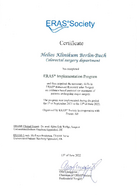Liver Cancer — Atypical Marginal or Wedge Liver Resection: treatment in the Best Hospitals in the World
Treatment prices are regulated by national law of the corresponding countries, but can also include additional hospital coefficients. In order to receive the individual cost calculation, please send us the request and medical records.

Department of General, Abdominal Surgery and Surgical Oncology
The Department of General, Abdominal Surgery and Surgical Oncology offers the full range of services in these medical fields. Whenever possible, operations are performed using minimally invasive techniques, which are the gold standard of modern surgery. The outstanding quality of medical care is confirmed by numerous prestigious certificates, including certificates from the German Cancer Society, the German Hernia Society, etc. In addition, the department provides innovative hyperthermic intraperitoneal chemotherapy (HIPEC), which is available only in the most progressive clinics in Europe.







Department of General and Abdominal Surgery, Colorectal Surgery, Hepatopancreatobiliary Surgery, Hernia Surgery and Bariatric Surgery
The Department of General and Abdominal Surgery, Colorectal Surgery, Hepatopancreatobiliary Surgery, Hernia Surgery and Bariatric Surgery provides the full range of surgical treatment in its field of competence. The department's highly qualified surgeons annually perform about 2,000 surgical interventions. Extensive clinical experience allows the specialists to perform even particularly complex operations. The department’s advanced operating rooms serve for surgery to treat gastrointestinal diseases, liver, gallbladder, bile duct, pancreatic, rectal, anal and colon pathologies. The medical facility also successfully performs operations to treat hernias: inguinal, umbilical, and anterior abdominal wall hernias. In addition, the department's doctors deal with the surgical treatment of morbid obesity. Minor traumatic laparoscopic interventions are considered the gold standard, which guarantee a patient minimal risks and rapid postoperative restoration. Surgeons tell the patient in detail about their upcoming treatment and, in every possible way, support them in their recovery.







Department of General and Abdominal Surgery, Colorectal Surgery, Endocrine Surgery and Hernia Surgery
The Department of General and Abdominal Surgery, Colorectal Surgery, Endocrine Surgery and Hernia Surgery offers the full range of modern surgical interventions in the areas of its specialization. Every year, the medical facility performs more than 2,500 surgical interventions on an inpatient and outpatient basis. The department has vast clinical experience in the field of minimally invasive surgery, which allows the patient to avoid severe pain and prolonged hospitalization. In addition, the department offers robotic surgery using the most modern models of the da Vinci surgical system. The medical facility has the status of the Reference Center for Minimally Invasive Surgery and Hernia Surgery. Surgical treatment of cancer is one of the department's clinical priority focuses. A large number of da Vinci robot-assisted interventions are performed here for gastrointestinal cancers. The department holds a leading position in the use of the da Vinci surgical system in the treatment of rectal and sigmoid cancer patients. The operating rooms of the medical facility are equipped with the very latest technology, while hygiene and safety standards are at the highest level as well. Prior to surgery, the patient undergoes a comprehensive examination. Doctors also assess the risks of the upcoming operation and its expected results. With appropriate clinical indications, preference is always given to minimally invasive surgery.






Liver resection surgery (partial removal of the organ) is the main surgical treatment for cancer of this organ. About 30% of patients are considered operable at the time of initial diagnosis. Surgery is the best treatment option with the highest survival rate for patients. Today, there is a tendency to expand the indications for surgical intervention. Patients who were previously denied surgical treatment can now receive it. However, liver surgery is complex and unsafe. You should seek medical help from a specialized center abroad for a cancerous liver tumor removal to expect success and not suffer from complications. On our website, you can select the most suitable hospital and schedule your treatment appointment for your preferred dates.
Content
- What is an atypical resection?
- How is the operation performed?
- Who may be a candidate for an atypical liver resection?
- How much of the liver will be removed?
- Where can I get treatment?
What is an atypical resection?
The liver is made up of lobes and segments. If an entire segment is removed, the operation is called a segmentectomy. If a lobe is removed, it is called a lobectomy. If half of the liver is removed, it is called a hemihepatectomy, which can be right or left-sided. All these types of resection are anatomic or typical ones.
However, if doctors remove part of the liver without any reference to its internal structure, such a liver resection is considered atypical.
The benefits of this approach are as follows:
- Less tissue is removed, preserving more functioning parenchyma
- Lower risk of liver failure
- Surgery is possible in patients with a lower functional reserve of the liver
- Shorter duration of surgery
However, there are disadvantages, such as increased blood loss, risk of tissue necrosis due to ligation of blood vessels and bile ducts, and risk of thromboembolism through the ligated hepatic vein.
Physicians abroad take a balanced approach to choosing surgery for each patient, taking into account all the advantages, disadvantages, expected effectiveness of the operation, and potential risks. If your doctor believes that you can safely undergo atypical resection, it is worth listening to him or her in order to preserve more liver volume and be less likely to suffer from liver failure after surgery.
How is the operation performed?
The operation is usually performed through a long incision in the abdomen. However, in recent years, minimally invasive approaches such as laparoscopy and robotic surgery have been increasingly practiced in developed countries. The second option for liver cancer treatment is associated with a higher average cost of treatment, but it overcomes the limitations associated with the mobility of instruments in laparoscopy. In addition, robotic surgery is safer for the patient.
There are the following options for atypical liver resection:
- Wedge resection for liver cancer involves the excision of a wedge-shaped fragment
- Atypical marginal liver resection can be performed if the tumor has a marginal location
- Planar liver resection can be performed if the tumor is located on the diaphragmatic surface of the liver
- Transverse liver resection can be performed in the lateral section of the left half of the organ
What type of operation will be performed depends on the location and size of the tumor.
Who may be a candidate for an atypical liver resection?
There have been debates for many years about what type of partial liver resection (hepatectomy) is better for liver cancer. The supporters of anatomic resections argue that segmentectomy is preferable because it provides theoretical advantages in reducing the risk of local recurrence by removing possible satellite lesions and microscopic dissemination.
But so far, these advantages remain theoretical because there is no evidence that anatomic resection is preferable for all categories of patients. A large meta-analysis of 12 studies (Yun-Hao Tang) showed that survival rates after different types of surgery are comparable.
The currently accepted approach is that patients with higher functional liver reserve undergo anatomic resections, while non-anatomic resections are indicated for patients with lower functional reserve to help preserve more tissue.
According to the study by Alessandro Cucchetti et al., hepatic wedge resection for liver cancer compared to more extensive surgery reduces the risk of liver failure from 66% to 14% compared to more extensive surgery in patients with clinically significant portal hypertension. Therefore, this type of liver surgery is preferred whenever possible (if tumor location and size allow) in patients with a hepatic venous pressure gradient greater than 10 mm Hg.
How much of the liver will be removed?
After part of the liver is removed, this organ can regenerate. However, most cancers develop due to cirrhosis, and a cirrhotic liver regenerates poorly. This is one of the main reasons why surgeons have to resort to atypical resections. They seek to preserve a larger volume of the liver to reduce the risk of death from liver failure.
A normal liver can regenerate even after the removal of 70-80% of parenchyma, provided that doctors have managed to preserve normal blood supply and bile outflow. However, in cases of cirrhotic liver changes, it is impossible to remove even 60% because such patients will most likely not survive due to liver failure.
Even in such situations, patients abroad can undergo surgical treatment, as the indications for it have expanded. Today, doctors perform selective portal vein embolization to shrink the size of the tumor and then perform an atypical resection that preserves a larger volume of liver parenchyma.
Where can I get treatment?
You can undergo an atypical liver resection abroad. The world's best clinics employ highly skilled surgeons. They use modern equipment that allows them to perform operations with a low risk of complications. In many cases, an atypical resection can be performed using a minimally invasive laparoscopic approach or with the help of a robotic surgical system.
You can find out the liver resection surgery cost and make your treatment appointment in one of the foreign hospitals via the Booking Health service. Our specialists will help you select the most suitable hospital and organize your trip. When you make your treatment appointment through our service, the cost of medical services will be lower for you than when you contact a medical center directly, due to the absence of additional fees for international patients.
Authors:
The article was edited by medical experts, board certified doctors Dr. Nadezhda Ivanisova and Dr. Vadim Zhiliuk. For the treatment of the conditions referred to in the article, you must consult a doctor; the information in the article is not intended for self-medication!
Our editorial policy, which details our commitment to accuracy and transparency, is available here. Click this link to review our policies.
Sources:

